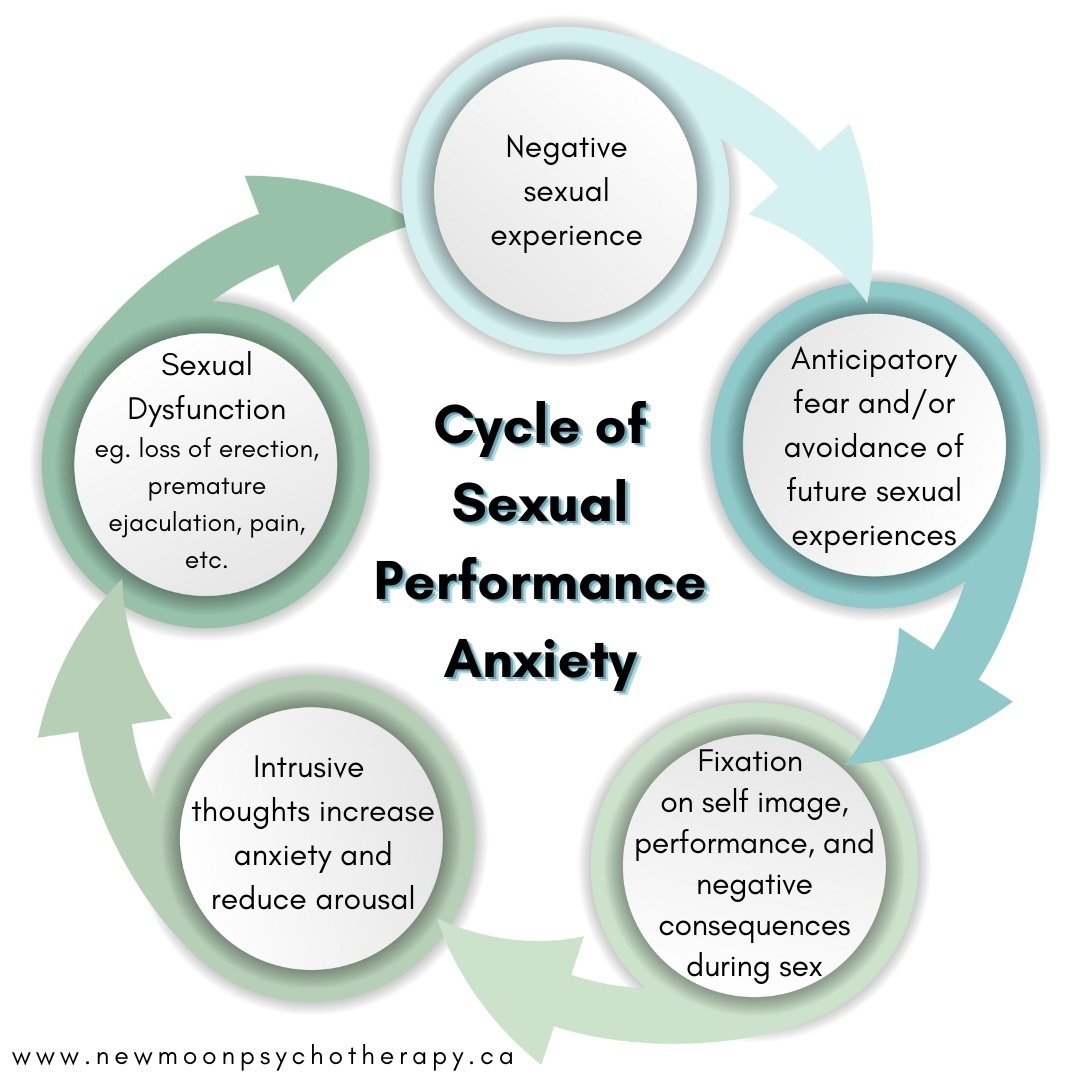Is sex a source of stress rather than pleasure?
 Do you experience sexual difficulties, such as painful intercourse or erectile dysfunction but doctors tell you there is no physiological cause?
Do you experience sexual difficulties, such as painful intercourse or erectile dysfunction but doctors tell you there is no physiological cause?
Are you more focused on whether you are having sex right than you are on your experience of pleasure?
Do racing thoughts, persistent self-doubt, and fear of disappointment keep you up at night?
If these experiences sound familiar, you may be experiencing sexual performance anxiety.
What is Sexual Performance Anxiety?
Sexual performance anxiety is a common psychological issue affecting individuals of all ages, genders and sexual orientations. At the core of sexual performance anxiety, is the fear of not being able to perform sexually to one’s own or one’s partner’s satisfaction. This fear can lead to a cycle of stress and worry, ultimately affecting one’s overall sexual well-being and sexual functioning.
Individuals experiencing sexual performance anxiety often view sex as a performance based activity that needs to be done right, rather than a shared experience of pleasure.
Who is at risk of sexual performance anxiety?
Sexual performance anxiety can impact anyone at anytime. Some risk factors include:
- Co-occurring anxiety or depression
- Body image concerns
- Stress and pressure from societal expectations
- Past negative sexual experiences
- Relationship difficulties such as feeling undervalued or unappreciated by your partner
- History of trauma
- Being highly critical of self
- Unrealistic expectations and lack of knowledge about sexual performance
Common Symptoms of Sexual Performance Anxiety.
Psychological Symptoms
Fear of Failure: Preoccupation with the concern that you will not be able to perform adequately or satisfy your partner. Eg. “What if I can’t perform well enough?” “What if I lose my erection”
Negative Self-Talk: Engaging in self-criticism and self-doubt. “I’m not good enough” “I’ll disappoint my partner”
Ruminating on Past Failures: In your mind, replaying previous, sub-optimal, sexual encounters.
Concerns About Judgment: Concern that a partner will judge, criticize, or reject you based on your sexual performance, such as, “They will think I’m such a loser if I lose my erection” “He’s going to think his ex was better”
 Negative Self-Image: Feeling self-conscious about your body and appearance. Strong beliefs that you are not attractive or desirable, affecting your confidence and sexual performance. Eg. “I’m not sexy” “They will see my belly fat”
Negative Self-Image: Feeling self-conscious about your body and appearance. Strong beliefs that you are not attractive or desirable, affecting your confidence and sexual performance. Eg. “I’m not sexy” “They will see my belly fat”
Performance Pressure: Experiencing pressure to meet unrealistic expectations, often influenced by unrealistic societal standards and outdated understanding of sexual performance. Eg. “I need to squirt” “I need to last for hours”
Loss of Control: Feeling like you have no control over your sexual response or orgasm, which can lead to anxiety during sex. Eg. “If I let myself have an orgasm I will be too loud” “I don’t like losing control” “If I have an orgasm I will ___ and be judged for it”
Anticipatory Anxiety: Experiencing worry and anxiety before a sexual encounter including thoughts and visualizations about all the things that can go wrong. Eg. “What if they don’t like how I kiss?” “What if I lose my erection?”
Catastrophizing: Assuming the worst possible outcomes, like imagining a sexual encounter turning into a disaster.
Overanalyzing: Obsessively analyzing your partner’s reactions and body language for signs of disappointment or dissatisfaction. Eg. “Was that moan real?” “Are they faking it?” “Why are they so quiet?”
Comparisons: Comparing yourself to others or to idealized (and unrealistic) images of sexual performance, which can lead to feelings of inadequacy. Eg. “I don’t look like porn stars” “I’m supposed to last for hours” “My partner doesn’t moan like ___ so they must not like it”
All of these thoughts pull you out of the experience of pleasure which is essential for fulfilling sexual experiences. They are part of the cycle of anxiety which continues to feed anxiety.
Addressing sexual performance anxiety often involves challenging and reframing these negative thought patterns through therapy and developing healthier attitudes towards sex, self-esteem, and relationships. Psychotherapy, including cognitive-behavioral therapy (CBT) and Mindfulness can be a powerful approach to staying present and managing thoughts contributing to sexual performance anxiety.
Sexual Dysfunction
Sexual performance anxiety can lead to sexual dysfunctions through a complex interplay of psychological and physiological factors. Here’s how it can result in various sexual dysfunctions:
Erectile Dysfunction (ED): Anxiety and stress can trigger the release of adrenaline, which constricts blood vessels. This constriction can reduce blood flow to the penis, making it difficult to achieve or maintain an erection.
 Premature Ejaculation: Anxiety can lead to heightened arousal and a hypersensitive ejaculatory response. This can result in ejaculating sooner than desired, causing premature ejaculation.
Premature Ejaculation: Anxiety can lead to heightened arousal and a hypersensitive ejaculatory response. This can result in ejaculating sooner than desired, causing premature ejaculation.
Delayed Ejaculation or Anorgasmia: Some individuals with sexual performance anxiety may experience difficulty reaching orgasm. The heightened anxiety can interfere with the ability to relax and experience sexual pleasure.
Low Desire: None of us want to do things that cause us distress! The constant worry and pressure associated with sexual performance anxiety can lead to a decrease in sexual desire or interest, affecting the overall sexual experience.
Vaginismus: People with vulvas who experience sexual performance anxiety may experience involuntary vaginal muscle contractions, making penetration painful or impossible.
Dyspareunia (painful intercourse): The stress and tension associated with sexual performance anxiety can result in painful intercourse due to increased muscle tension and reduced arousal impacting lubrication.
Cycle of Worry: A cycle of anxiety can develop, where past experiences of anxiety or sexual dysfunction during sexual encounters lead to future anxiety, creating a self-fulfilling prophecy of sexual dysfunction.
Sexual dysfunctions caused by performance anxiety are often temporary and can be effectively treated with the right support and interventions. Psychotherapy and sex therapy are valuable approaches to address the root causes of sexual performance anxiety, helping individuals manage their anxiety, enhance their self-esteem, and develop healthier attitudes towards sex and relationships, ultimately leading to improved sexual experiences.
* It is important to note that sexual dysfunctions can be caused by various psychological, medical, and physiological factors. Any time you experience sexual dysfunction it is important to be assessed by a doctor to rule out any medical or physiological causes. Medical assessment typically includes a physical exam, blood work, and a visit with a specialist such as a gynecologist (if you have a vulva) or urologist (if you have a penis). Once medical and physiological causes are ruled out or identified, we can treat the psychological causes.
Relationship Issues
 Sexual performance anxiety can strain relationships, leading to communication problems, decreased intimacy, and emotional distance between partners, all of which can contribute to sexual dysfunctions. Over time, these difficulties can have a profound impact on your overall quality of life.
Sexual performance anxiety can strain relationships, leading to communication problems, decreased intimacy, and emotional distance between partners, all of which can contribute to sexual dysfunctions. Over time, these difficulties can have a profound impact on your overall quality of life.
Avoidance
As a result of anxiety, some individuals may begin to avoid talking about sex or sexual encounters altogether to escape the fear of performance issues. This avoidance can reinforce the anxiety and lead to sexual dysfunction over time.



 Therapy is a safe and supportive space for individuals to work through their anxiety, build confidence, and develop a healthier attitude towards sex and relationships. It empowers individuals to regain control over their sexual well-being and improve their overall quality of life.
Therapy is a safe and supportive space for individuals to work through their anxiety, build confidence, and develop a healthier attitude towards sex and relationships. It empowers individuals to regain control over their sexual well-being and improve their overall quality of life.